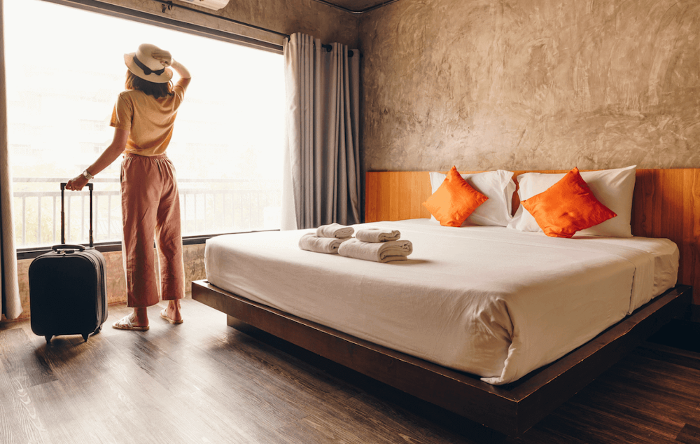May 25, 2022
Environmentalism is on the rise across the globe, and it’s inspiring to see. Both individuals and businesses are getting on the path to greener and more ethical practices—with hospitality, in many cases, at the forefront of that charge.
Hilton has dedicated itself to reducing carbon emissions by half and adding zero soap to landfills by the year 2030. Marriott has LEED-certified hotels in development and is implementing climate change strategies to meet goals by 2030, as well. And Starwood Hotels have set goals to see a 30% reduction in greenhouse gas emissions and a 30% reduction in energy and water consumption (per hotel room) by the year 2020. In other words, real change is happening, and guests definitely care. In fact, recent consumer research surveying 72,000 Hilton guests showed 33% of those guests “actively seek out” eco-friendly information on a hotel before booking—and 44% under 25 years old do the same. For those considering putting environmental changes into play at their hotels, those survey results should be encouraging—especially when it comes to attracting guests to the millennial and Gen Z camps.
To help you organize a plan, we’ve put together key strategies to boost your hotel’s eco and ethic-friendly footprint. Once you start, remember to get the message across to potential guests by highlighting your commitment on your website, third-channel booking sites, social media, and press releases.
Put Together a Green Group
Gather key members of your hotel staff and develop a group dedicated to overseeing green initiatives. Each team member can be assigned to a specific area of your hotel (i.e. Maintenance, Kitchen, Housekeeping, Guest Rooms) or a specific facet of the initiatives (i.e. Water Conservation, Recycling, Energy Use, etc.). From there, they’ll be responsible for sharing goals with their staff, implementing strategies, and keeping track of progress. To motivate, you can even reward teams with the most savings each quarter. Also, remember to have annual or bi-annual property meetings to ensure every staffer is on the same green page.
Upgrade to Energy Efficient Appliances & Fixtures
If financially feasible, start replacing your hotel’s older, less energy-efficient appliances and fixtures with today’s most energy-efficient models—and in some cases, enhance your upgrades with other smart strategies (i.e. install occupancy sensors on HVAC in low-traffic areas or on lighting in common areas). Depending on your property’s location, there may even be rebates to make the changes more affordable, plus in the long run, the energy savings will make the cost worthwhile. Here are some of the most important appliances/fixtures to consider for upgrades.
- ENERGY STAR®-rated LED lighting for rooms, common areas, and exit signs (uses at least 75% less energy and lasts 25% longer than conventional incandescent lighting)
- ENERGY STAR®-certified commercial clothes washers and dryers (washers are about 25% more efficient and use about 45% less water than traditional models/dryers use about 20% less energy)
- ENERGY STAR®-certified commercial dishwashers (typically 40% more energy and water efficient than traditional models)
- ENERGY STAR®-qualified beverage vending machines (50% more energy-efficient than standard models)
- ENERGY STAR®-certified batch-type ice makers for guest floors (typically 10% more energy-efficient and 20% more water-efficient than conventional models)
- EPA WaterSense®-labeled toilets, urinals, showerheads, faucets (WaterSense-labeled toilets use 20% less water than what the Federal standards mandate/ WaterSense-labeled showerheads use no more than 2.0 gallons per minute)
- EPA WaterSense®-labeled pre-rinse spray valves for kitchens (use 20% less water than what the Federal standards mandate)
- EPA WaterSense®-labeled irrigation controls (Typically save an annual average of 15%)
- Properly sized ENERGY STAR®-certified light commercial HVAC equipment (Typically 6% more efficient than traditional units)
- Smart thermostats for guest rooms and common areas (Can be programmed to lower or raise temperature based on occupancy)
- ENERGY STAR®-certified commercial water heaters (uses 25% less energy than conventional units)
- Solar water heaters for swimming pools with variable-speed pumps
- Carefully Select Products Used at Your Property
Upgrade your hotel’s buying practices to include green, sustainably sourced products. Think about switching to natural housekeeping cleaning products like Method (which is a LEEDS-certified facility) or Seventh Generation. Fill lobby restroom dispensers with plant-based, eco-friendly soaps like Mrs. Meyers, Method, or GoJo. Look into using plant-based, cruelty-free shampoos and conditioners (i.e. Aveda or LUSH) and buy-in large bulk bottles. Why? Because cruelty-free, ethically produced toiletries score high with guests, plus those little plastic guestroom bottles are a big problem in landfills. A great alternative is to mount refillable dispensers for shampoo, conditioner and body wash on shower walls.
Modify Menus
Review your hotel’s restaurant menu with the chef and talk about adding more eco- and ethical-friendly items. For example, only purchasing coffee, tea, and chocolate that’s fair trade. Cook with as many local, organic ingredients as possible to support your community. And since animal agriculture has proven to be an enormous contributor to climate change, adding more vegetarian and vegan dishes on the menu.
Create a Standardized Process for Staff that Promotes an Eco-Friendly Agenda
Create a more environmentally conscious process for housekeeping, kitchen staff, and maintenance in particular. They should be savvy about wasteful behavior and knowledgeable about ways to improve their efficiency.
- Print door hangers for housekeeping that gives guests the option of reusing sheets and/or towels to reduce washer-related water consumption
- Have housekeeping check guest room toilets and sinks for leaks or malfunctions—and report problems to maintenance immediately
- Washing machines should only run with full loads and should avoid using extra rinse cycles
- Make sure housekeeping is conservative in water use while cleaning rooms (i.e. Do not leave shower water running longer than necessary for rinsing and do not flush toilets excessively)
- Kitchen staff should ensure exhaust fans, dishwashers, and water faucets are properly turned off before closing down for the night
- Maintenance should check air filters on a regular schedule, and inspect appliances, pipes, and other equipment for leaks or operational failures
Create Less Waste
Reduce, Reuse, Recycle. This is such an important concept that can make a tremendous impact on our nation’s landfills. While your hotel may recycle typical items like cardboard, cans, and appropriate plastics, there is still a lot of waste happening in areas you may not think about. One of the largest problems, for instance, is used guest room soap—a product that is filling landfills, while it could be used to benefit underprivileged communities.
Here are some guidelines to help you cut back on waste and when possible, benefit others while doing it.
- Enroll your hotel with Clean the World® and send them your guest rooms’ used bars of soap. The organization recycles and thoroughly cleans these discarded items and distributes them to those who need them most. So far, over 44 million bars of soap have been donated to more than 127 countries. Hospitality businesses currently partnered with Clean the World include Hilton Worldwide, Marriott®, Caesars Entertainment®, Intercontinental Hotel Groups, Walt Disney World® Resort, Best Western, Choice Hotels®, and thousands of others.
- Buy products in bulk to minimize packaging
- Have an appropriate number of recycling bins in the hotel kitchen and throughout your property
- Ensure any carryout food containers are recyclable
- Begin paper towel composting from common area restrooms (paper toweling with grease or chemicals should not be composted)
- Donate excess, never-served banquet food to the community’s hungry (i.e. MGM Resorts in Las Vegas, NV started a highly successful food donation program to avoid wasting thousands of pounds of unserved food)
- Donate excess fruits and vegetables to farms to feed the animals
Remember, change comes in small steps—and no one expects an eco-friendly overhaul in a year. But every green step your hotel takes can make a difference to the environment and in your overhead. Plus, it gives you an opportunity to show your environmentally and ethically conscious guests that your hotel supports a better, more sustainable world.


